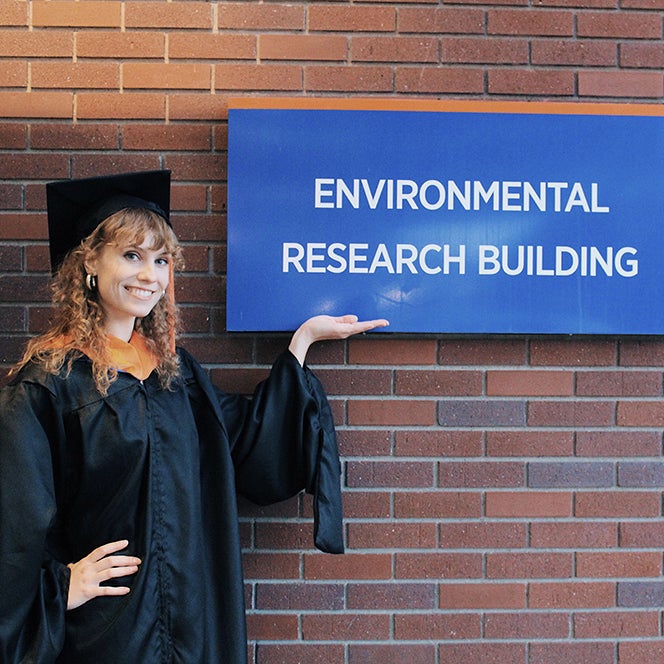A backpacking trip in the Sawtooth Wilderness inspired an opportunity for an education close enough to escape to explore this area as often as possible. For master’s student Melisa Hancock, this inspiration became a reality as Boise State provided her the perfect opportunity to live close enough to the wilderness while also receiving a higher education. Originally from Galt, California, Hancock left home as a first-generation college student with no connections to Boise State University or the community determined to be the first in her family to graduate from college.

Hancock will graduate on Dec. 18 with her master’s of science in civil engineering. Hancock used her time in the College of Engineering to develop her passions of sustainability and public policy. This passion grew during her time as an undergraduate student working alongside associate chair and professor of civil engineering, Bhaskar Chittoori.
“I have worked with Melisa since her sophomore year and over this time I have seen Melisa evolve into an able and independent researcher,” Chittoori said. “She has both the right attitude to conduct research and the brains to get things done, I believe that is a perfect combination that will take her places.”
Because Hancock was a first-generation college student, she found her inspiration and motivation from numerous teachers, counselors, professors, organizations, and her father. The guidance from these inspirations and her involvement in Girls Scouts of the USA helped shape and motivate her for her academic future.
“Engineers make a big impact on the world, but I’ve always thought I wanted more than a regular nine-to-five job,” Hancock said. “This degree will help lead me to various leadership positions where my impact can be even bigger.”
Along the way, Hancock was able to pursue classes in public policy that helped further drive her graduate research. The College of Engineering helped expose faculty like Bhaskar Chittoori, Mojtaba Sadegh, and others to Hancock who aided her in developing her passions. Hancock was exposed to numerous clubs and organizations, such as the Society of Women Engineers, connecting her to other female engineers at a conference who encouraged her to further her education and pursue a master’s degree.
“Don’t be let down by the intimidation you may face as being a woman in STEM,” Hancock said. “Don’t just settle for a bachelor’s degree. Set your goals high that align with your degree and never give up until you reach those goals.”
Hancock’s thesis, “Developing Implementable Building Construction Policies through International Policy Diffusion” focused on analyzing building codes from some of the world’s most sustainable countries to develop policy recommendations for the United States combining her passion of sustainability and public policy in finding a way to implement better sustainable practices into the world of civil engineering.
Upon graduating, Hancock plans to move to Nashville, Tennessee, to gain more experience in the engineering industry by pursuing a few potential job opportunities she has expressed interest in. Hancock’s ultimate goal is to work in policymaking for engineering and to try and incorporate sustainability into all engineering practices.
“I’m very grateful for College of Engineering and the help they provided me with a fellowship that helped pay for my master’s degree, reducing a lot of stress financially,” Hancock said. “From that I was able to help teach labs, work on research projects and grow my civil practices, and work as a research assistant.”
-by Jamie Fink